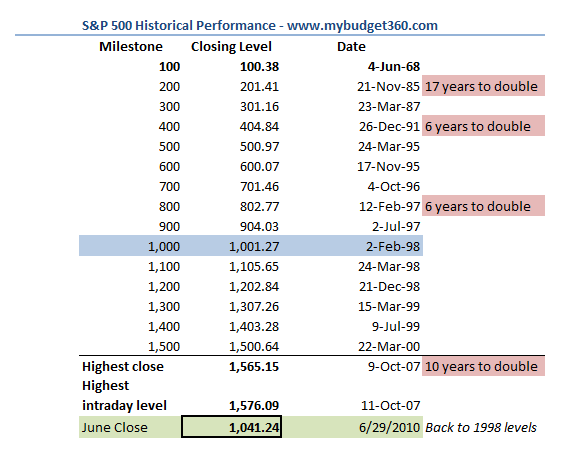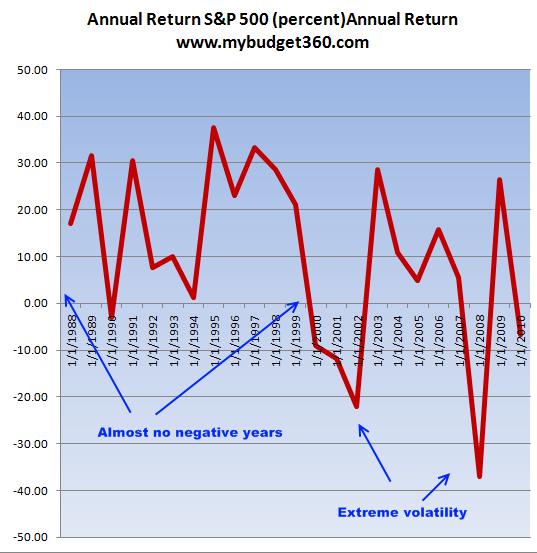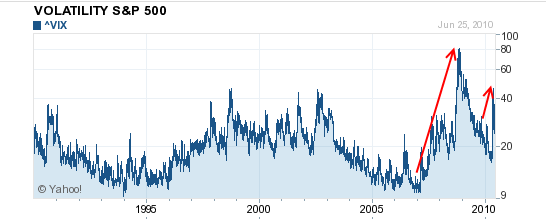Stock market volatility reflects a weak economy and the end of a generational bull market. S&P 500 back to 1998 levels. Middle class thrown to the wolves in this stock market.
- 2 Comment
The economic crisis has ushered in the end of a generation long bull market. Most average investors ignore the fact that heavy market volatility is a sign of an unhealthy stock market. The stock market since the lows reached in 2009 has been on an unstoppable bull run. Yet the real economy where most Americans work and spend money has not reflected any of this irrational exuberance. The S&P 500 has rallied 53 percent from the lows reached in early 2009 and that is including the current retracement back. On Tuesday the stock market pulled back on data showing consumer confidence plunging from what analysts had expected. Outside of Wall Street the economy is walking on eggshells.
If we look at S&P 500 data we find that we have entered into a new era:
The above chart highlights milestones for the S&P 500 dating back to 1968. For the S&P 500 to double from 100 to 200, it took a slow 17 years. From 200 to 400 it took 6 years, an incredibly quick jump. Another 6 years after that and the S&P 500 was riding high at 800. From 1997 to 2007 the S&P 500 went from 800 to 1,576 in the intraday high that is now far in the past. It almost doubled yet again in a 10 year horizon. Yet that trend has been broken. The S&P 500 is now back to 1,041 and has pulled back to levels seen in 1998. Does anyone really see the S&P 500 going to 2,000 any time soon?
“The stock market needs to reflect the underlying health and productivity of the overall economy and not simply the gambling penchant of Wall Street banks.â€
Most of America is dealing with the new austerity that is being thrust on them from an unforgiving economy and a government that seems to be preoccupied with helping out the financial industry before setting things right with the average worker. In other words, the middle class is being thrown to the wolves in this crisis. The government is serving the interest of big money at the detriment of the middle class.
If we look at the volatility of the S&P 500 over the past 22 years we’ll notice two different stories. From 1988 to 2000, the stock market enjoyed a once in a lifetime bull run. There were virtually no negative years and some incredible year over year gains. Keep in mind that we are looking at a 12 year timeframe on a tiny chart but this is over a decade of mental conditioning here. If we look from 2000 to our present day, the massive amount of volatility has sent the S&P 500 to levels seen in 1998:
2008 was the worst stock market year since the Great Depression. That is how bad that one year turned out for investors. This large amount of volatility simply reflects a weak real economy and the recent stock market run to the peak of the mountain was super charged by taxpayer money going into large investment banks who in return went into the stock market and gambled your hard earned money. Clearly it hasn’t done much for consumer confidence, aiding in the foreclosure crisis, or bringing jobs back. What then did all this money really accomplish?
If we look at the VIX which looks at option trading volume and is a good sign of volatility we also see this recent stock market reshuffling:
What we can gather from all this volatility is a new paradigm has arrived. Most popular financial books that hype compound interest always focus on a convenient 7 to 10 percent annualized gain in the stock market. That may have been the case from 1968 to 2000 but that isn’t the case anymore. What are you going to invest in when U.S. Treasuries are barely offering any interest and bank accounts are offering rates of 0.01 percent on savings accounts? Your mattress would rival some of these rates.
The stock market right now is one large casino. No real reform has taken place and that is why we see no real changes in the economy yet trillions of dollars funneled into a financial abyss. Someone got this money but clearly it wasn’t the middle class. The public was told that money was going to go to shore up the housing market (didn’t happen) and to keep lending to the public going (didn’t happen). So what did happen was that big investment banks used taxpayer money and gambled to bolster their own profits. That was basically the smoke and mirrors campaign that we have gone through.
The middle class is largely a casualty of this all. 9 out of the top 10 jobs in this country are in low paying service sector work. We hear this rhetoric about a double dip but the middle and working class never got out of the first dip to begin with. Who is this double dip for? Wall Street gamblers who have funneled taxpayer money into the casino? Must be nice for their 53 percent rally but sadly none of that is reflected in the real economy. If we want to be happy about gambling why not talk about the person who just won the lottery last night.  Wall Street certainly won the lottery here at the expense of the taxpayers. The collapse of consumer confidence is merely a reflection of what most of us already know. The real economy has never recovered.
This is the end of a generational bull run just like the 1920s came crashing down with the Great Depression. Unlike that time, we have allowed the banks and Wall Street to continue to pollute our real economy with their gambling schemes. Can you believe that no real reform has taken place? No wonder why average Americans are displeased with both political parties and are furious at Wall Street.
If you enjoyed this post click here to subscribe to a complete feed and stay up to date with today’s challenging market!2 Comments on this post
Trackbacks
-
Harry Rondo said:
“Stock market volatility reflects a weak economy and the end of a generational bull market….”
More accurately, I think a weak stock market presages a weak economy. In addition, what we are probably witnessing is the end of the Super Cycle bull market that began in 1932, or more like three generations.
June 30th, 2010 at 3:38 pm -
Val Nettles said:
Our dictator Obama is privately looking at nationalization of 401k plans and IRA accounts that total $15 trillion. Funded debt is about $14 trillion. Connect the dots! Argentina did it ($29 billion) of taxpayer retirement funds. This will happen when our govt. sees a national emergency. This could be a physical attack (like 9/11); or a change in credit status, such as going from triple AAA to double AA of our bonds. Meetings have already been held. Pass the word!!. If this happens, this will prolong the current lousy economy. Any devices (stimulus,etc) inserted to help the economy will make for a worse ending. But as you can see from recent happenings, our dictator is not interested in helping America. Bucgator
August 3rd, 2010 at 10:50 pm



 If you enjoyed this post click here to subscribe to a complete feed and stay up to date with today’s challenging market!
If you enjoyed this post click here to subscribe to a complete feed and stay up to date with today’s challenging market! Follow us on Twitter!
Follow us on Twitter!